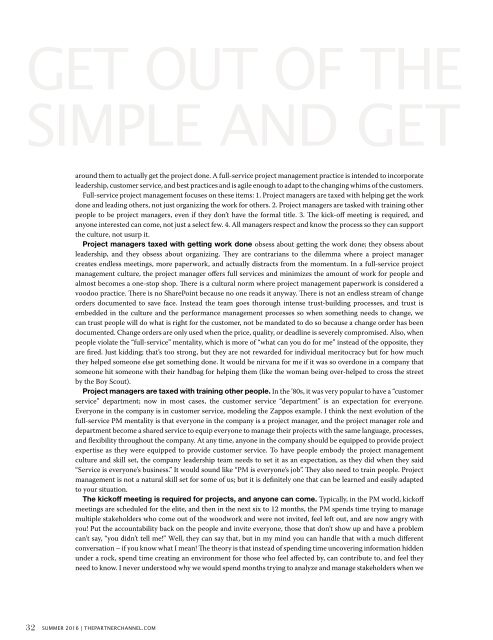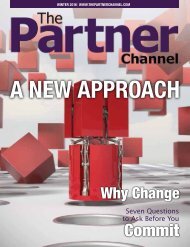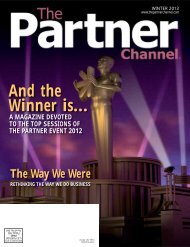The Partner Channel Magazine Summer 2016
The summer issue of The Partner Channel Magazine is all about becoming the total package in the Microsoft Dynamics Partner community. Learn how to round out your roster, enhance your professional skills, and more!
The summer issue of The Partner Channel Magazine is all about becoming the total package in the Microsoft Dynamics Partner community. Learn how to round out your roster, enhance your professional skills, and more!
You also want an ePaper? Increase the reach of your titles
YUMPU automatically turns print PDFs into web optimized ePapers that Google loves.
GET OUT OF THE<br />
SIMPLE AND GET<br />
around them to actually get the project done. A full-service project management practice is intended to incorporate<br />
leadership, customer service, and best practices and is agile enough to adapt to the changing whims of the customers.<br />
Full-service project management focuses on these items: 1. Project managers are taxed with helping get the work<br />
done and leading others, not just organizing the work for others. 2. Project managers are tasked with training other<br />
people to be project managers, even if they don’t have the formal title. 3. <strong>The</strong> kick-off meeting is required, and<br />
anyone interested can come, not just a select few. 4. All managers respect and know the process so they can support<br />
the culture, not usurp it.<br />
Project managers taxed with getting work done obsess about getting the work done; they obsess about<br />
leadership, and they obsess about organizing. <strong>The</strong>y are contrarians to the dilemma where a project manager<br />
creates endless meetings, more paperwork, and actually distracts from the momentum. In a full-service project<br />
management culture, the project manager offers full services and minimizes the amount of work for people and<br />
almost becomes a one-stop shop. <strong>The</strong>re is a cultural norm where project management paperwork is considered a<br />
voodoo practice. <strong>The</strong>re is no SharePoint because no one reads it anyway. <strong>The</strong>re is not an endless stream of change<br />
orders documented to save face. Instead the team goes thorough intense trust-building processes, and trust is<br />
embedded in the culture and the performance management processes so when something needs to change, we<br />
can trust people will do what is right for the customer, not be mandated to do so because a change order has been<br />
documented. Change orders are only used when the price, quality, or deadline is severely compromised. Also, when<br />
people violate the “full-service” mentality, which is more of “what can you do for me” instead of the opposite, they<br />
are fired. Just kidding; that’s too strong, but they are not rewarded for individual meritocracy but for how much<br />
they helped someone else get something done. It would be nirvana for me if it was so overdone in a company that<br />
someone hit someone with their handbag for helping them (like the woman being over-helped to cross the street<br />
by the Boy Scout).<br />
Project managers are taxed with training other people. In the ’80s, it was very popular to have a “customer<br />
service” department; now in most cases, the customer service “department” is an expectation for everyone.<br />
Everyone in the company is in customer service, modeling the Zappos example. I think the next evolution of the<br />
full-service PM mentality is that everyone in the company is a project manager, and the project manager role and<br />
department become a shared service to equip everyone to manage their projects with the same language, processes,<br />
and flexibility throughout the company. At any time, anyone in the company should be equipped to provide project<br />
expertise as they were equipped to provide customer service. To have people embody the project management<br />
culture and skill set, the company leadership team needs to set it as an expectation, as they did when they said<br />
“Service is everyone’s business.” It would sound like “PM is everyone’s job”. <strong>The</strong>y also need to train people. Project<br />
management is not a natural skill set for some of us; but it is definitely one that can be learned and easily adapted<br />
to your situation.<br />
<strong>The</strong> kickoff meeting is required for projects, and anyone can come. Typically, in the PM world, kickoff<br />
meetings are scheduled for the elite, and then in the next six to 12 months, the PM spends time trying to manage<br />
multiple stakeholders who come out of the woodwork and were not invited, feel left out, and are now angry with<br />
you! Put the accountability back on the people and invite everyone, those that don’t show up and have a problem<br />
can’t say, “you didn’t tell me!” Well, they can say that, but in my mind you can handle that with a much different<br />
conversation – if you know what I mean! <strong>The</strong> theory is that instead of spending time uncovering information hidden<br />
under a rock, spend time creating an environment for those who feel affected by, can contribute to, and feel they<br />
need to know. I never understood why we would spend months trying to analyze and manage stakeholders when we<br />
32 SUMMER <strong>2016</strong> | THEPARTNERCHANNEL.COM














